Photonics Engineer by day, indie RPG writer by night, especially interested in open/CC games.
See my stuff here: http://awkwardturtle.games
- 9 Posts
- 32 Comments

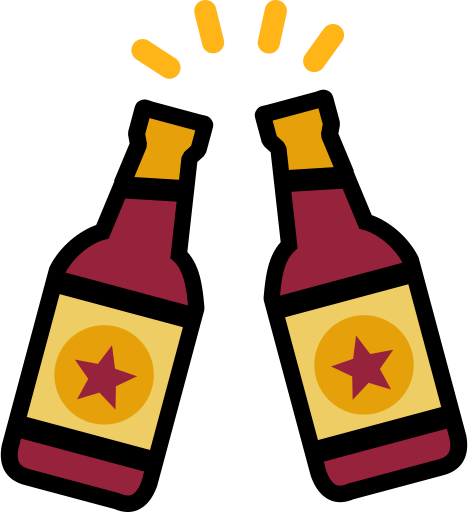 5·1 year ago
5·1 year agoThank you! I have next to nil artistic ability, so I actually really surprised myself by managing to make something I actually liked with these labels.

 6·1 year ago
6·1 year agoYeah, I don’t know if that tracks. Wingspan has sold more than 1.3 million copies (as of September 2021) which is way way way more than the average board game sells.
I’d far more believe that they couldn’t keep up with production than they were intentionally limiting supply.

 4·1 year ago
4·1 year agoOoo, fantastic. I’ve been doing sugar extractions of lemon zest for a mead recently, and we tried drying and blitzing the zests after filtering.
For us the powder was nice (partly because it got a bit candied during the process) but fairly mild in taste. I think it could still absolutely be fun to use to sprinkle on desserts of drinks, for visuals if nothing else.

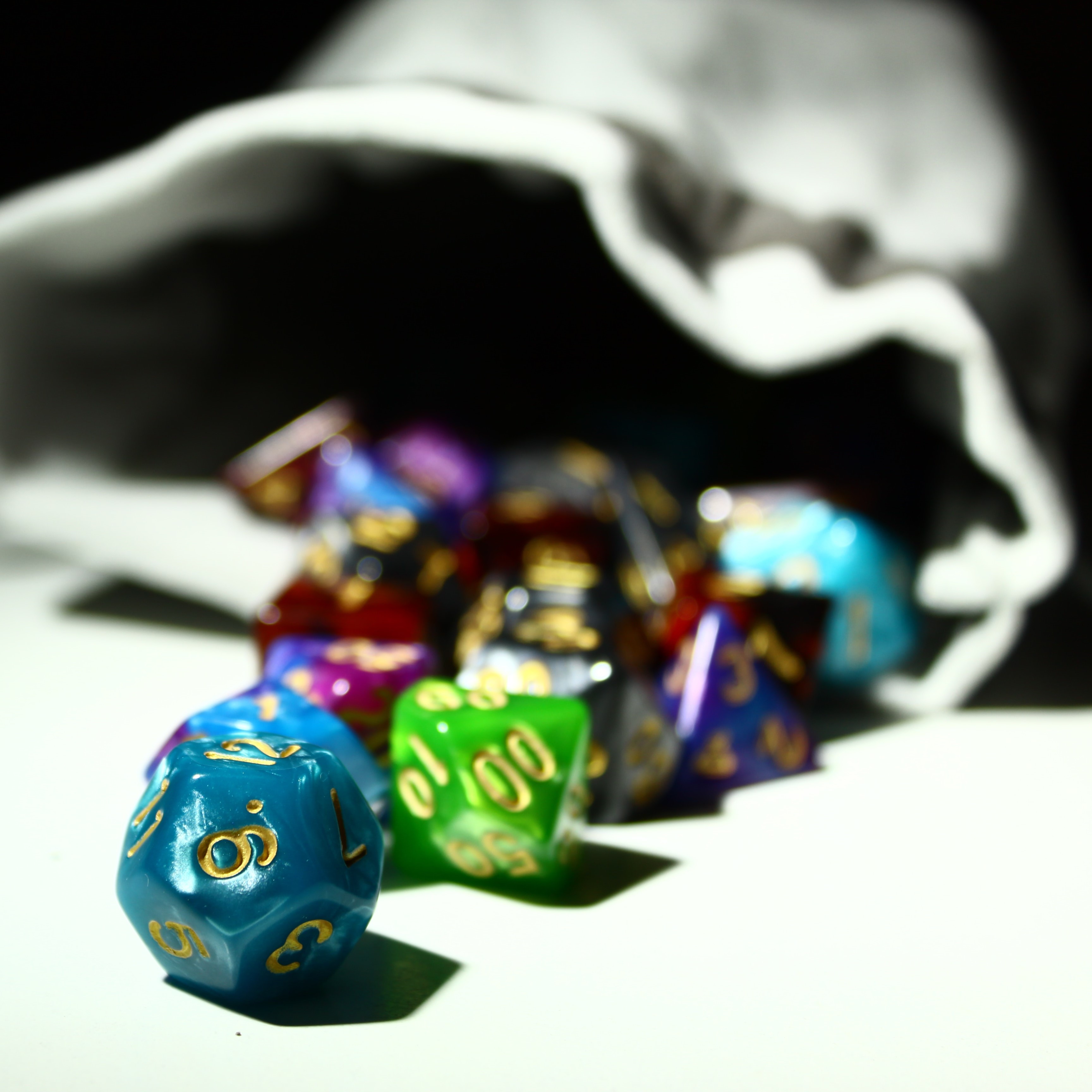 3·1 year ago
3·1 year agoAlso if you use The Estate box set you have a nice, episodic little campaign pre-built for Mausritter. It’s a small hex crawl with a bunch of pamphlet adventures scattered around them, complete with hooks to tie them all together.
Might be a good ongoing structure, especially if you have an inconsistent group, or intend to be swapping GMs periodically.

 3·1 year ago
3·1 year agoI’d love to do so, but the price seems to jump up by an order of magnitude and it’s difficult to justify. I’ll probably be trying a combo of filter + sulfites going forward.

 4·1 year ago
4·1 year agoHaving recently tried the filtering thing, it’s still a roll of the dice unless you’re using the much more expensive professional grade filters.
It does get your mead clear as hell though, and removes a ton of off flavors.
Our kettle actually partially died a few months ago, had a long debate about what we should replace it with before I realized the contacts on the base had just gotten bent out of place.
A buddy of mine printed the robot mittens for me, and even managed to track down a paint that nearly perfectly matches the color. I absolutely love them. How do you like the metal ones?
Nice! A surprising amount of overlap with out own coffee station!
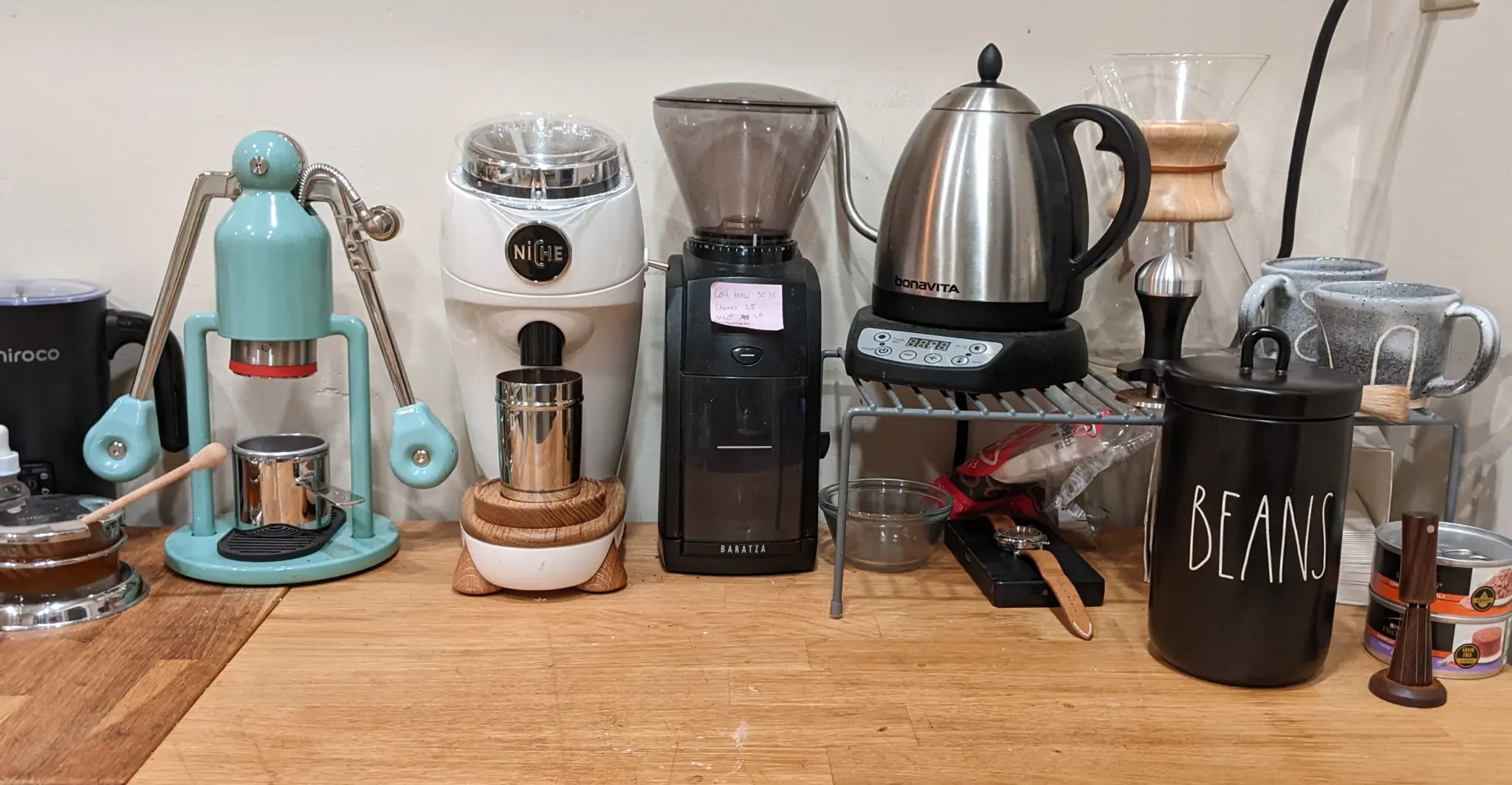
I’ve almost certainly go too many books, but for me RPG books are two things:
- Something I do or plan to use the actual contents of. Whether that be rules, tools, or adventures.
- Physical objects that are nice to look at and hold.
Happily the indie RPG scene is very good at making books that cover both of those categies. I will once in a while go through the collection and give away books that I both don’t think I’ll ever use, and also aren’t nice enough as objects to be worth keeping around.
I also have a number of magazine bins filled with zines, which I love but also desperately needs to be pared down.
Also because I will take any opportunity to share a shelfie:
Desk RPG shelf of “close to hand” stuff (and also tall books because they don’t fit on the other shelves).
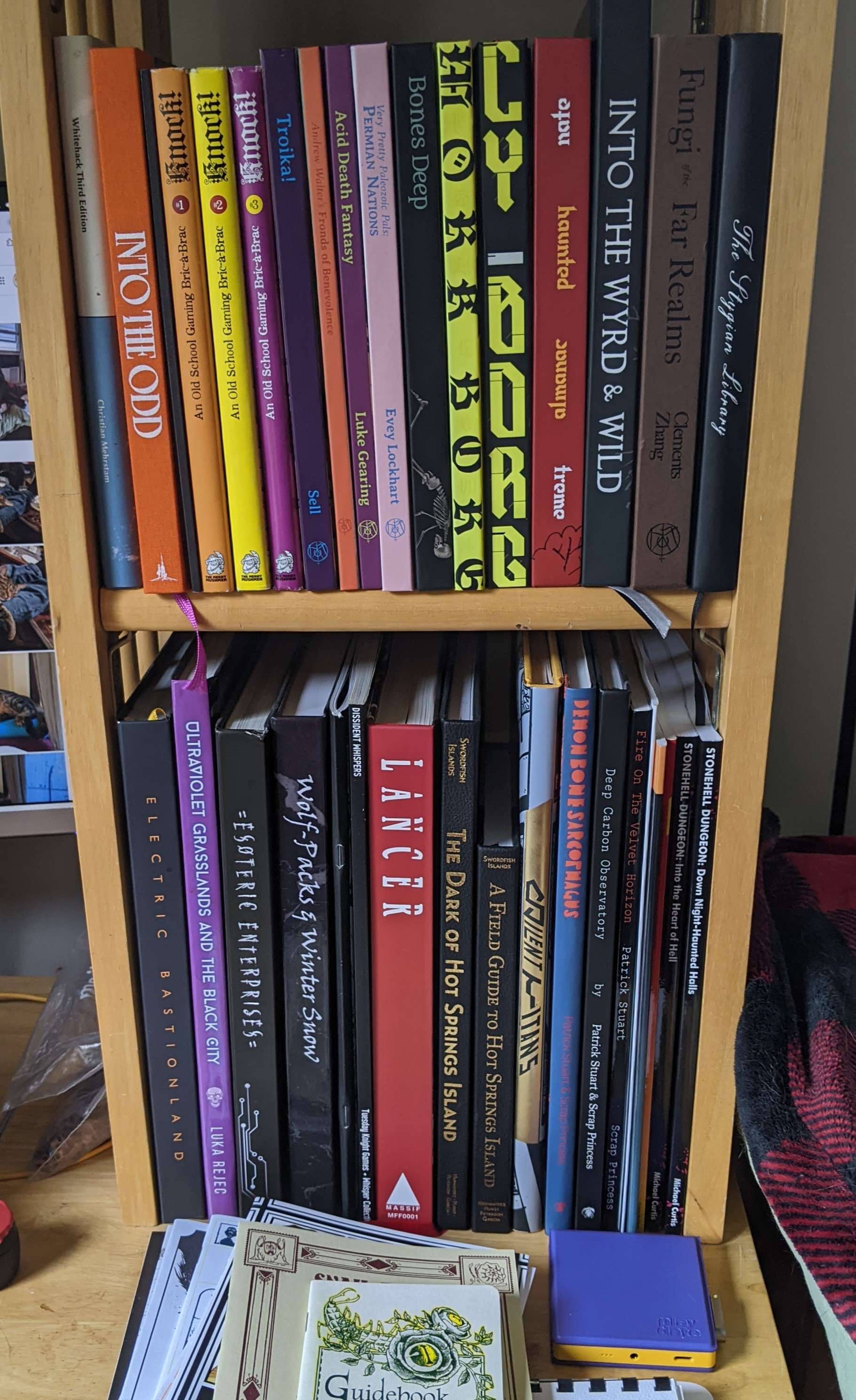
Ancillary bookshelf of RPG stuff:
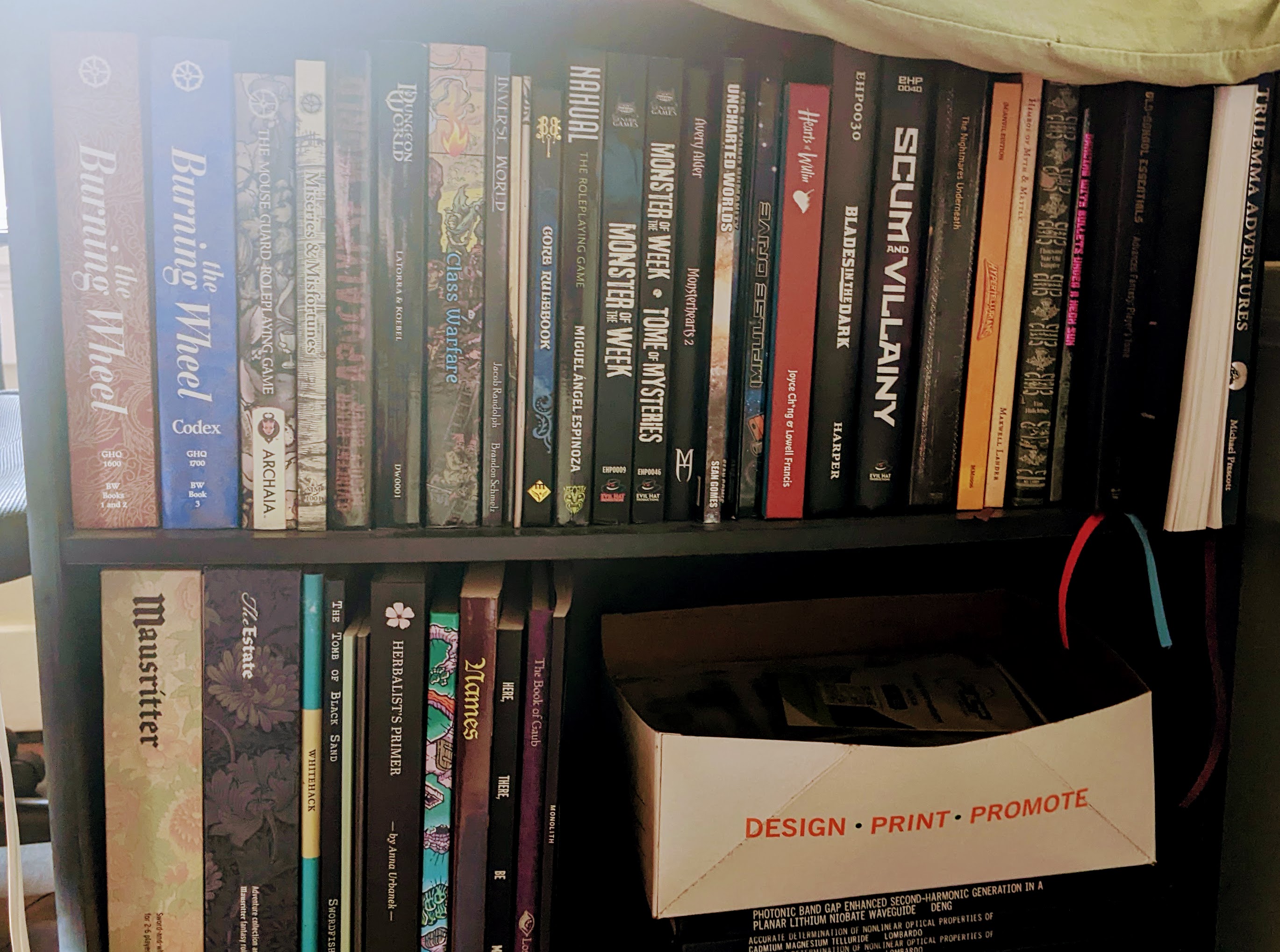
From my understanding espresso beans do tend to be roasted darker to help increase extraction. I know that at least for my manual espresso press I need to use a significantly different recipe to get a nice shot out of light roasted beans.
Broadly though, I do think the cultural idea of espresso is that it’s a small, super intense cup of coffee which in turn implies it being very bitter as that’s the main coffee flavor people can imagine being intensified. Especially when you consider that a lot of people’s idea of espresso likely comes from pod machines which, in my experience, tend to make very bitter shots.
I was genuinely shocked the first time I had a shot of a espresso from an actual coffee shop and the predominant flavor was sour not bitter.
So, yeah, I do think it’s very common for people to associate espresso with dark and bitter coffee.> I said it sounds like you just haven’t had good espresso
Edit: FWIW, if you’re looking to actually talk to someone about all this, lines like, “I said it sounds like you just haven’t had good espresso,” is not a great way to engender a good conversation.

 3·1 year ago
3·1 year agoWhen in doubt, age it out!
Alternatively you could consider back sweetening, or oaking, to add some extra flavor that might counterbalance it some.

 2·1 year ago
2·1 year agoI used Lalvin 71b, and a couple days after pitching it occurred to me that this would have been a great opportunity to use something more suited to purpose.
Honestly different yeasts is something I haven’t really dug into much yet, although I want to. Currently I just have a big stash of 71b and default to that for every mead.
I guess the question is whether your goal is to make all three stats equally useful, or to make sure the attribute damage mechanic is used equally on all three stats.
If it’s the former then increasing the utility of the other two stats with initiative, magic, dodging, etc. would be a good way to go.
If it’s the latter then making sure enemies have a wide variety of attacks works. Psychic/psionics, poison, ensnaring, soul damage, etc. would all help.
Although I do like applying damage to other stats where appropriate, I don’t actually think you need to if what you’re worried about is balancing them.
STR is the more important attribute if you’re consistently getting into combat. All these games share an ethos that combat shouldn’t be a hugely frequent thing at the table. In that context, the stats are a lot more “balanced”. DEX is by far the most called for Save, in my experience, plus it’s how you go first in combat.
WIS/CHA is a little trickier, depending on your individual campaign. Although in Mausritter specifically casting spells can cause WIL damage.
FWIW this is something I grappled with a bit for my own Odd/Cairn hack (slightly exacerbated by some other rules changes), and I eventually came to the conclusion that I didn’t need rules changes to fix it. The only thing I really plan to do is make sure the included bestiary includes examples of damage to other attributes.

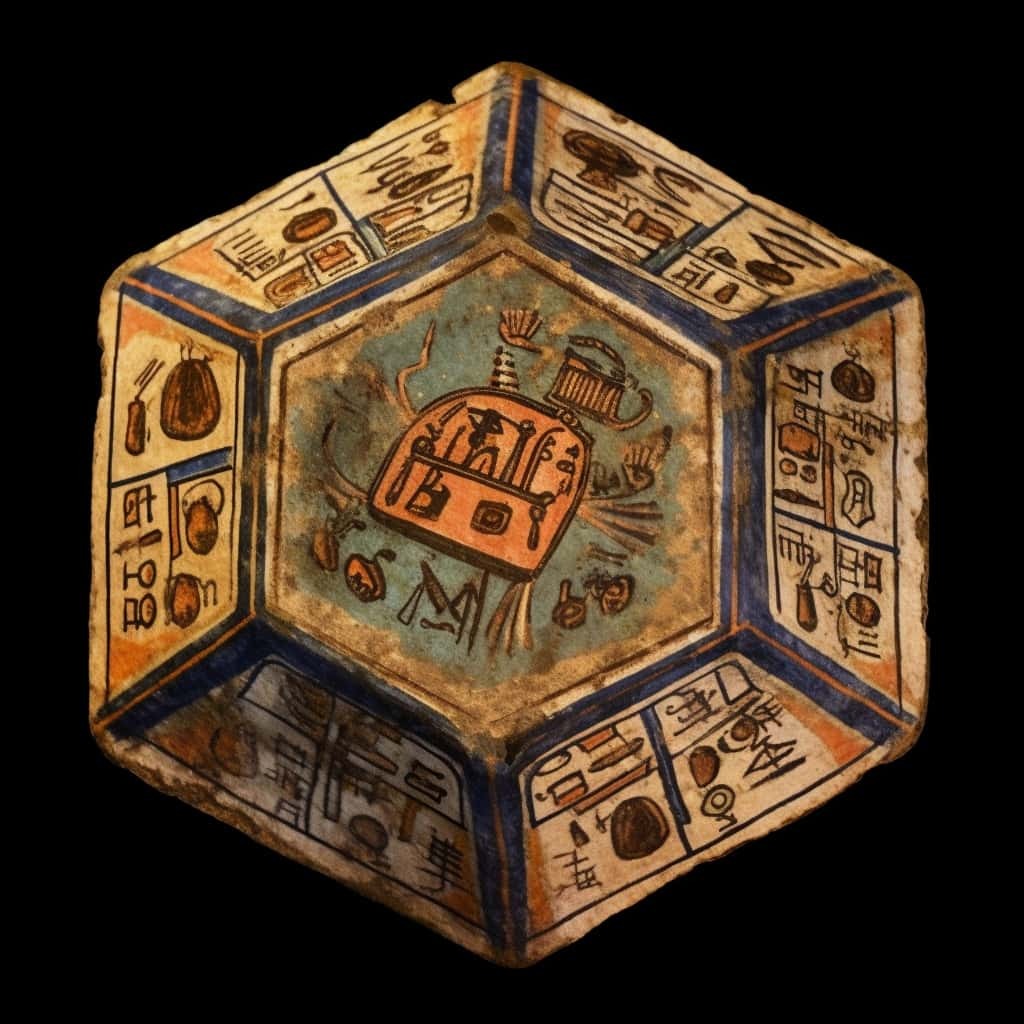 1·1 year ago
1·1 year agoI’ve written a couple similar posts recently, so I’ll consolidate those and add a few more. Apologies for any overlap with existing comments here.
Into the Odd is the epitome of rules light, striped down ,classic DnD. How many rules can you remove and still retain a playable game and the classic adventuring feel? Turns out most of them! This game has spawned a truly absurd amount of hacks, and if you sit down to read and play ITO you’ll see why. The physical copy of the remastered edition is a gorgeous little book as well.
Electric Bastionland is the bigger, younger sibling of Into the Odd. Written by the same author it takes the same core ruleset (with a tiny number of tweaks) and places it into a somewhat absurdist, wonderfully inventive, urban setting. This book is fantastic on many levels, including the unbelievable amount of artwork. Each of the more than 100 Failed Careers has its own piece, and the entire thing serves as a de-facto world-building section alongside its role in character creation. Also includes, in my opinion, the single best collection of GMing advice you can get in a physical book.
Cairn is one of the many aforementioned hacks of Into the Odd, but also pulls in the itemized inventory and character generation tables of Knave. If you want a quick to pick up and play system that pairs nicely with all those OSR modules you’ve been collecting but haven’t run, this is for you. It is not mechanically, directly compatible with b/x stat or adventure, but the dead simple framework makes it extremely easy to convert things on the fly (or just use the large, and growing, list of pre-conversions for various modules. It’s garnered a huge community and spawned its own set of hacks.
Mausritter is an ITO hack in a similar space as Cairn, but you’re playing as tiny mice adventuring in a big and dangerous world. The physical version has super fun cards to use with the slot based inventory, and the digital version is totally free. I’ve found this to be a great gateway (or long term stay!) for the N/OSR space because it’s very easy for people to get into the proper headspace. It makes sense to run away from danger, come up with clever plans to ambush dangerous foes, sneak rather than fight, etc… you’re a tiny mouse! Also if any of your players were into Redwall as kids this will be an easy pitch.
Mothership RPG is a sci fi horror game in the vein of Alien. It has a number of fantastic modules to play, both first party and written by the large and very active community it has fostered. Simple core rules, and great if you’re looking to run a one shot where you expect your players to either lose their minds or get eaten by a monster by the end of the session.
Wolf-Packs & Winter Snow is a prehistoric roleplaying game. Fascinating ideas, really cool setting, a neat loop of hunting and gathering to sustain your tribe (you get XP when something you’ve hunted is eaten, not just killed). Magicians don’t have spellbooks, they have spell locations. I have sadly not actually run or played this one, but it’s such a fun thing to read.
Troika! is an off the wall, somewhat absurdist science fantasy RPG. It has, the core book especially, the best short form, expressive, writing that manages to imply a grand complex setting in a tiny space. Many of the first and third party supplements are also great, I’ll specifically recommend Acid Death Fantasy for a tripped out Dune experience or Very Pretty Paleozoic Pals for playing as actual dinosaurs this book is great. The actual ruleset of Troika! is not for me, but I’ve run plenty of fantastic sessions using it and I love, love, love the writing, art, and settings.
MÖRK BORG is the art-punk, heavy metal, apocalyptic fantasy game. This book gets a lot of attention (and sometimes flak) for it’s dense and complex art and layout, for good reason the book is gorgeous to flip through, but it also contains a nicely working core of rules light d20 gameplay. It also contains The Calendar of Nechrubel, where at irregular points in your game (the rough frequency decided by the table at the start) a new misery occurs, plunging the cursed world into further darkness. When the seventh, and final, misery occurs the world, the game, and your lives end. You are instructed to burn the book. Which all means you get to drive your characters like stolen cars, the world’s ending anyway!
CY_BORG is the cyberpunk version of the above, and trades a dying fantasy world for a chrome and neon corporate dystopia.
Blades in the Dark has you playing as a gang of scoundrels in a Dishonored-esque whale oil powered city besieged by ghosts beneath a sky filled by a dead sun and a shattered moon. It’s got a compelling core loop of going on missions, getting stressed out on those missions, indulging your vices to relieve that stress, getting into trouble because you overindulged, and then needing to go on more jobs to get cash to dig yourself out of that trouble. Going on big heists, and do flashbacks Oceans 11 style to do a dramatic reveal of a hidden aspect of your plan.
Scum and Villainy is Forged in the Dark but you’re a crew on a space ship plying your way in a sci fi galactic sector. Variably Star Wars, Firefly, or Cowboy Bebeop depending on your choice of starting ship, and the direction you take the game.
CBR+PNK is another Forged in the Dark game, but compacted into a set of pamphlets where you take the role of cyberpunk runners performing one last job before retirement (or before one last attempt at revenge).
Tunnel Goons is extremely easy to pick up and play, endlessly mod-able and flexible. There are gobs of hacks of this game floating around, and it’s easy to see why.
Maze Rats is a classic quick to pick up system. Compact, with a wonderful set of tables that are useful even if you don’t end up playing the game.
The Black Hack (or a physical copy) is a nice, rules light take on classic d20 fantasy adventuring, complete with the traditional classes of Warrior, Thief, Cleric, and Wizard.
The Whitehack a super interesting take on old school play. The base classes are extremely flexible and interesting. Roll a d20 under attribute and over AC for combat. This game has possibly the highest density of good ideas to steal, even if I find some of the text a little obtuse (the newer editions are better about this).
Macchiato Monsters is a more flexible, open ended mashup of the above two games. Flexible, “build your own character” classes system, and I hope you like usage dice (or risk dice, whatever you want to call them), because they’re everywhere here.
Self Promo Zone
I’ve got two work in progress games of my own.
Brighter Worlds (online SRD here) is my more light-hearted, whimsical take on the N/OSR space, through the lens of Evlyn Moreau’s fantastic artwork. It’s a hack that combines Electric Bastionland, Cairn, and Macchiato Monsters but worked into a form with what I’m calling “modular crunch”. It’s meant for GMs (like myself) that want super simple core rules, but with players that might want something more crunchy, with more levers to pull at the table. Each of the Callings has their own set of modular rules that (if I’ve done my job correctly) no one else at the table has to understand, avoiding combinatorial complexity of teaching the game, and the GM just needs to give a thumbs up or thumbs down once in a while. Many of the Callings are fairly open ended and require buy in and interpretation on the part of the player and table, so it’s not for everyone.
Meteor (online SRD here) is my more straightforward hack of Cairn. It ostensibly exists because I wanted to run Mothership modules with Into the Odd rules, but its started to expand a bit in scope from that point. It takes a slightly more golden age, pulp sci fi tone, and (like Cairn) does not have mechanical compatibility with Mothership but should be very easy to convert on the fly as needed.
I could probably keep going with with more systems, and don’t even get me started on the similar question but for modules, but at some point I’ve got to cut myself off and get actual work done.
Please let me know if I’ve made any errors or have any broken links.
Edit: Totally did not realize which community I was in while writing this comment, whoops. I can remove the non-OSR/NSR systems if we’d like to keep the discussion a bit more focused.

 1·1 year ago
1·1 year agoI honestly haven’t really done much stabilizing because I like my meads dry, so I don’t bother backsweetening. From my research KSorb/KMeta is your best as a home brewer, but it has some pitfalls.
Filtering is sorta a huge pain in the ass, and like I said doesn’t even guarantee stabilization unless you go for the professional grade equipment with the “absolute” filter ratings which is pretty dang expensive. Plus you’ll need either pressure, a pump, or gravity and a lot of patience to get it through the smallest sized filters.
My filtering was done with the fairly inexpensive plate filters with “nominal” size ratings, which means it doesn’t promise it’s actually getting everything.
I think fining plus just waiting a very long time for things to settle out gets you about as good of an outcome as filtering, as far as clarity and taste goes, but I’m still experimenting so I can’t say for sure.

 7·1 year ago
7·1 year agoI’m no expert, been doing it as a hobby for about five years now, but from my own experience I’ll make a few notes:
- Be prepared to wait for your mead to age out, especially if you go high ABV and pure honey with no additions. If you want fast turnaround do sweet, low ABV meads or make beer instead.
- Time forgives all sins. If your mead tastes like ass, simply wait long enough and it’ll probably taste great. Sometimes that time frame is 2 or 3 years, but it’ll (probably) get there eventually. Rack into a new vessel every once in a while as long as you’re seeing sediment collect at the bottom.
- Adding nutrients, especially adding it in steps during primary, makes a huge difference. As in, being able to drink your mead in 4 months rather than a year+. I’ve found the easiest way to do it is with Fermaid O and the TOSNA Calculator. There are more complex nutrient calculators out there if you want to get deeper into the math.
- I’ve also started adding O2 during primary fermentation, although I started it around the same time I started using yeast nutrient so I can’t really tell you how much of an impact it makes.
- I’ve personally found that doing one gallon batches just isn’t worth it, for all that I see it commonly online. Unless you’re doing low ABV mead, it’s going to take time to age out into something nice. At which point if it’s good, you’ll be disappointed you didn’t do a larger batch. It takes more setup equipment and 5+ gallon glass carboys are pricey, but if you have a local homebrew store getting a basic fermentation bucket (often found in beer homebrew kits) is very worth it. That also goes with getting actual airlocks which are cheap enough that I think it’s worth picking up to take less risks with your mead
- See if you can get your honey locally, and if they’ll cut you a deal on buying in bulk. If you can’t, webstaurantstore.com has surprisingly reasonable prices for delivering 5 gallon buckets of honey.
- Making your wine sweeter is a good way to make it taste good faster without having to age as long, but do give dry meads a try! They’re very nice!
- I have filtered mead (using basic plate filters and gravity), and it improved the taste and clarity more than I was expecting. No idea how successful it was at stabilizing it because I didn’t backsweeten afterwards. From my research, if you want 100% guaranteed stabilization from filtering you’re looking at some pretty expensive equipment and filters. By the same token the science behind chemical stabilization as talked about in the OP is not as cut and dry as I was hoping, so I don’t know that there are good guarantees anywhere for this.
- Edit: Do research first if you want to attempt a bochet. Boiling honey expands to 3x the original volume, and superhot molten sugar is one of the most dangerous things you can have splattering around in your kitchen!

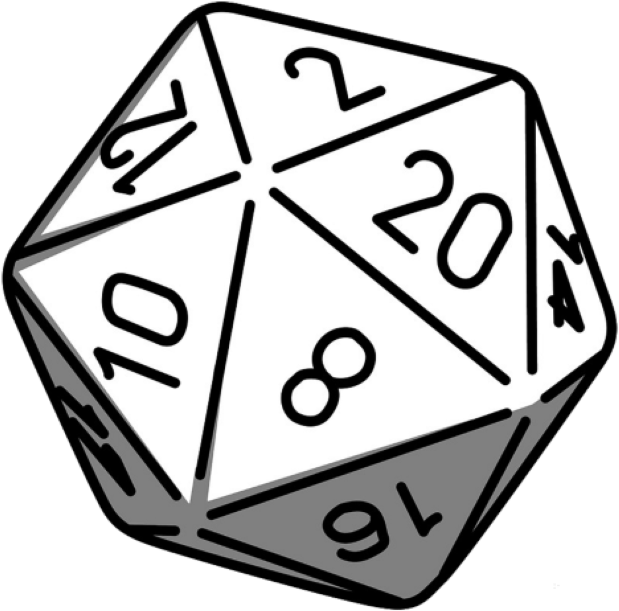 1·1 year ago
1·1 year agoRather than a specific system or style, I think the important thing is what gets you and your players excited. Pick a genre or theme that you are your players are into, then find a system that matches that. Once you get into it a bit more you can start digging into different styles of RPGs because you’ll have more context for what it all means and some idea of what you all like.
I like rules light systems because they’ve got a shorter “time to table”, but if everyone is very excited to play DnD, then DnD works because it’ll keep everyone motivated and engaged.
Some ideas:
Sci fi horror game along the lines of Alien: Mothership
Hardscrabble, fools forced to delve into dangerous dungeons and weird woods to make a living: Cairn
Grannies solving murder mysteries a la Miss Marple: Brindlewood Bay
A gang of thieves in a Dishonored-esque whale oil powered city: Blades in the Dark.
A gang of thieves flying a space ship in a star wars or firefly styled galaxy: Scum and Villainy
A doomed world undergoing heavy metal apocalypses: MÖRK BORG, or CY_BORG for the cyberpunk version of that.
Buffy and friends taking down vampire threats, or Mulder trying to find the truth that’s out there: Monster of the Week
Personally I’ve had really good luck introducing new players with Mausritter. The physical version is gives people a tactile card based inventory, the digital version is totally free. It’s super easy for people to get into the head space of tiny mice! There are also tons of fantastic modules to run which makes your job as a DM a lot easier.
This comment got a bit away from me, but I’ve run and played a ton of different systems, so if you have some idea of what you think you and your players will be into I can maybe point you in a more specific direction.

 1·1 year ago
1·1 year agoTunnel Goons might be a good fit. Extremely easy to pick up and play, endlessly mod-able and flexible. No wizards or magic out of the box, but would be easy to hack in (could even steal from my next suggestions).
Maze Rats is another super simple, quick to pick up system. If you choose to have magic at character creation, you get to a roll a random spell name each day and then decide what it actually does when you go to cast it.
The Black Hack (or a physical copy) is a nice, rules light take on classic d20 fantasy adventuring, complete with the traditional classes of Warrior, Thief, Cleric, and Wizard. Traditional DnD-ish spell memorization and casting.
Macchiato Monsters is a more flexible, open ended game based on the above suggestion (with some Whitehack mixed in). More flexible magic where you can create your own spells to do whatever you can imagine. A bit more work on the GM’s side (although I’ve actually written a little guide to help with that).
And if I can briefly self promo: Brighter Worlds (or the online SRD) is my own game, in part based on games like Cairn and Electric Bastionland, designed to have a simple core system and modular add-ons for each of the different character classes. It’s got a whimsical, magical, vibe and a lot of different options for what players might want to be doing (including several different ways to engage with magic). Might have a few more moving parts than you’re currently looking for though.






The bochet and berry meads aren’t doing anything super out of the ordinary (well, out of the ordinary if you’re already caramelizing your honey) but the Strawberry Lemonade one is weird enough that I keep meaning to do a full write up about it.
Just gotta actually get around to setting up a blog or website or something so I can host it someplace useful.